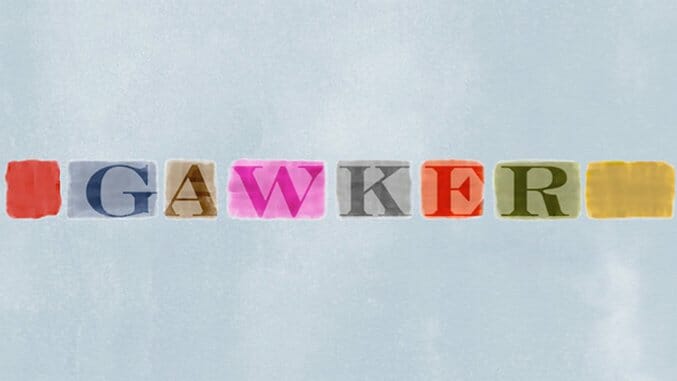We Are Worse Off Without Gawker, But Theirs Was No Idealistic Revolution

If Gawker can be said to have had a manifesto, it came not from founder Nick Denton, nor the website’s first editor, Elizabeth Spiers, but from Tom Scocca. He called it “On Smarm.” Writing more than a decade after the launch of the “Manhattan media news and gossip” blog, during which time it had morphed into a publication of national prominence, Scocca signaled his real purpose—the defense of “snark,” and therefore of Gawker—from the start:
Stand against snark, and you are standing with everything decent. And who doesn’t want to be decent? The snarkers don’t, it seems. Or at least they (let’s be honest: we) don’t want to be decent on those terms…
What is this defining feature of our times? What is snark reacting to?
It is reacting to smarm.
Note the “we,” snug against the close of the parentheses: “We” as in Gawker, “we” as in “the snarkers,” “we” as in the opponents of smarm, opponents, to be specific, of Buzzfeed, Dave Eggers, David Denby, Lee Siegel, American political culture, Michael Bloomberg, Google, Joe Lieberman, the chief executive officer of AIG, CNBC, Upworthy, Malcolm Gladwell, plagiarists, three films from 2009-2010, personal brands, and, on occasion, Gawker itself. But it’s the return of the “we” in Scocca’s conclusion that suggests the relationship between Gawker and the voice of the Internet, in other words the process by which Gawker helped create, develop, disseminate, and popularize the way we now talk to each other online. “We are exactly the same size as you are,” Scocca wrote. “Everybody is.”
![]()
In this sense—though the age of Gawker came to an end this week, the flagship site shuttered and the remaining Gawker Media properties sold to Univision for $135 million—it will live on like the heroes of myth, sung about by the bards of the once-and-future blogosphere, whatever shape it may take. This is not an appreciation, not of the sort that’s been written time and again since it became clear that we were indeed witnessing Gawker’s demise—orchestrated by thin-skinned Trump supporter and Silicon Valley tycoon Peter Thiel, with an assist from noted racist and general embarrassment Terry Bollea, also known as Hulk Hogan. In truth, I often despised Gawker: Its simpering, pit-of-snakes commentariat, with their pidgin idiot of ”+1”s and hurt feelings; its holier-than-thou staffers, hobbled by the belief that theirs was the one true path; its dispiriting obeisance to a particular, New York-centric view of the world as a constellation of ill-kept satellites desperate to remain in the city’s orbit.
I often adored Gawker, too: Rich Juzwiak’s lovely portrait of his life with editor and roommate A.J. Daulerio; Camille Dodero’s beautiful obituary for the Boston Phoenix; J.K. Trotter’s astute disquisition on the mediated nature of the footage of Ray Rice punching Janay Palmer in an Atlantic City casino; Trotter’s almost thrillingly extensive interview with Buzzfeed honchos Ben Smith and Jonah Peretti. I could go on. I could add that the Gawker’s journalism—mired in lawsuits and capable of inconceivable lapses in judgment — more than once mistook “information” for “news.” I could weigh its controversies against its contributions in order to determine whether we’re better off without it (we’re not). But I won’t, because the fact remains that Gawker, love it or hate it, has been perhaps the most influential media outlet of the digital era. It has even shaped those of us who’ll miss it the least.
![]()
-

-

-

-

-

-

-

-

-

-

-

-

-

-

-

-

-

-

-

-

-

-

-

-

-

-

-

-

-

-

-

-

-

-

-

-

-

-

-

-








































